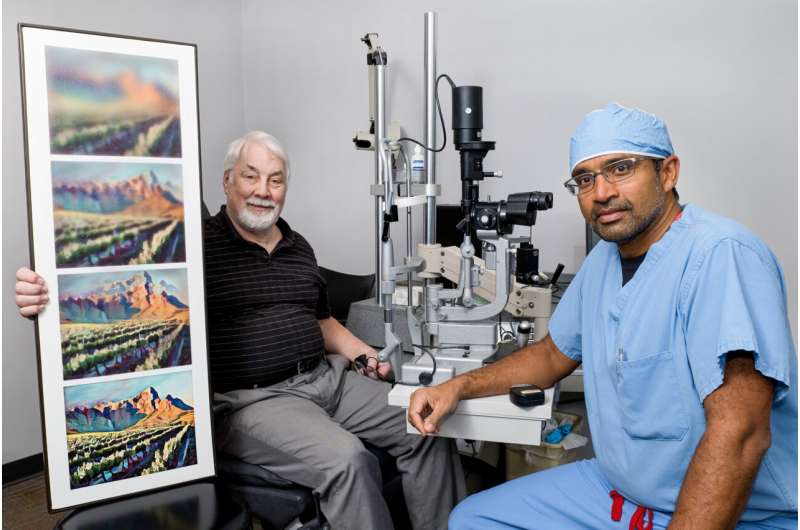This article has been reviewed according to Science X's editorial process and policies. Editors have highlighted the following attributes while ensuring the content's credibility:
fact-checked
peer-reviewed publication
trusted source
proofread
Early anti-VEGF treatment of diabetic retinopathy yields no benefit to visual acuity

While early treatment of diabetes-related eye disease slowed progression to severe disease, it did not improve visual acuity compared with treating more severe disease once it developed, according to a clinical study from the DRCR Retina Network.
"This study indicates that monitoring patients regularly for vision-threatening diabetes complications and treating eyes only as needed is the best approach," said Raj Maturi, M.D., Indiana University School of Medicine and Retina Partners Midwest, who is the protocol chair for the four-year study. The report was published today in the Journal of the American Medical Association (JAMA).
Anti-vascular endothelial growth factor (anti-VEGF) drugs can substantially decrease the risk of vision loss from diabetic retinopathy. However, eye care providers have been unsure when treatment should start to achieve the best long-term outcome. Anti-VEGF is given by injection into the eye, so physicians must weigh the risks for side effects and the expense and inconvenience of treatment against potential treatment benefit.
Diabetic retinopathy occurs when diabetes affects the blood vessels of the eye's light-sensing retina. In early stages, diabetes weakens retinal blood vessels, causing fluid to leak into the surrounding retina. This stage is called non-proliferative diabetic retinopathy (NPDR). Fluid buildup in the retina, called diabetic macular edema, is a complication of diabetic retinopathy and can lead to vision loss. Progression of the disease to proliferative diabetic retinopathy (PDR), where new, abnormal blood vessels begin to grow in the retina, can also threaten vision.
NEI-funded researchers evaluated whether treating people with NPDR with the anti-VEGF drug Eylea (aflibercept) could prevent vision loss. The study enrolled 328 participants, with 399 study eyes (some participants had two eyes that met criteria for enrollment in the study; others only had one study-eligible eye). Preventive anti-VEGF injections were given in 200 eyes at one month after enrollment, two months, and four months, and then every four months over two years. Preventative treatment continued every four months through four years unless NPDR improved to only mild disease. Sham injections (without drug) were used in 199 eyes over the same period. Any eye that developed a vision-threatening complication, such as macular edema or PDR was treated with additional anti-VEGF injections as necessary.
Two-year results of the study suggested that while preventive treatment reduced the risk of developing diabetic macular edema or PDR, there was no evident benefit to vision. These final, four-year results reinforce the earlier finding, with no statistical difference in either visual acuity or rates of vision loss between the two groups.
"We expected early treatment to prevent progression of diabetic retinopathy, but even with preventative injections, about one-third of eyes developed vision-threatening complications," said Adam Glassman, Jaeb Center for Health Research, Tampa, Florida, who directs the DRCR Retina Network coordinating center.
Over the four-year study, 34% percent of eyes receiving preventive treatments showed disease progression, compared with 57% of those in the sham group. On average, those in the preventive group received 11 injections, compared with an average of three in the sham group.
"While the individual risk of complications per injection is low, the risk increases with each additional injection," said Jennifer Sun, M.D., M.P.H., Joslin Diabetes Center, Harvard Medical School, Boston, and chair of diabetes initiatives for the DRCR Retina Network. "The results of this study indicate that the anatomic benefit from early anti-VEGF treatment does not result in improved visual acuity, and so it may not be worth the risk and inconvenience to the patient of repeat preventive injections for NPDR."
More information: Four-Year Visual Outcomes in the Protocol W Randomized Trial of Intravitreous Aflibercept for Prevention of Vision-Threatening Complications of Diabetic Retinopathy, JAMA (2023). DOI: 10.1001/jama.2022.25029
The Clinicaltrials.gov identifier for this study is NCT02634333.



















